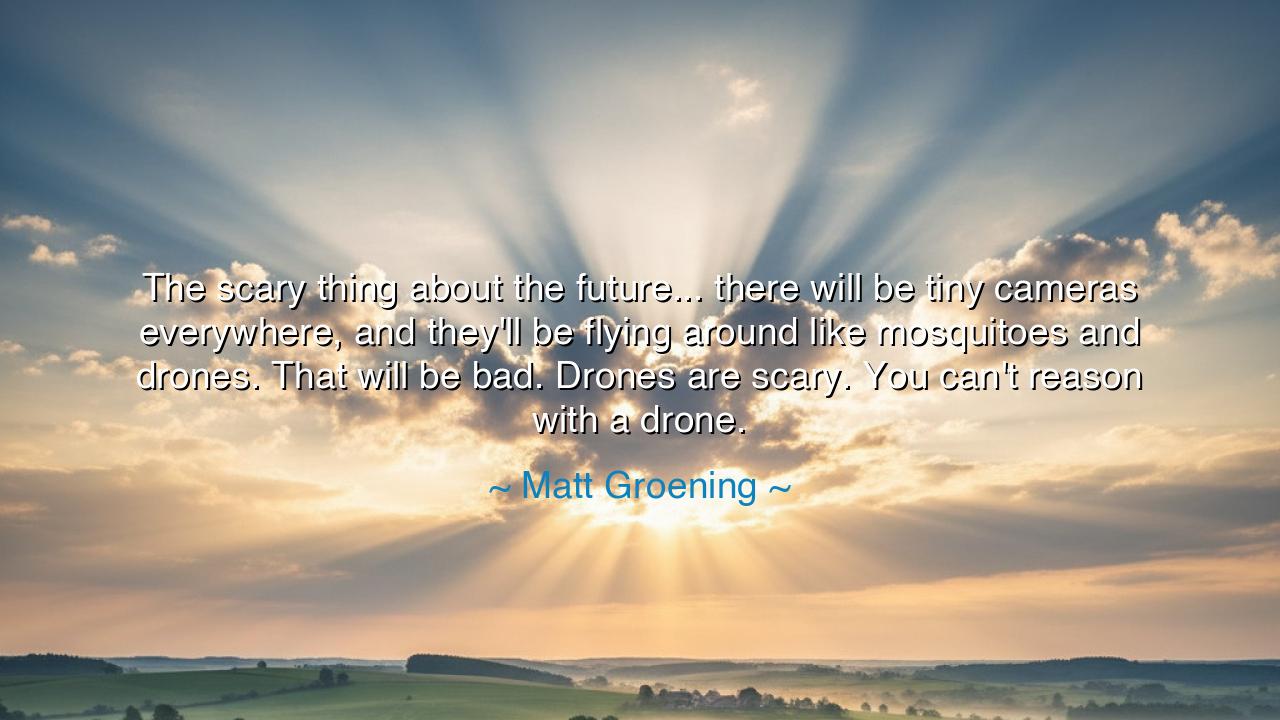
The scary thing about the future... there will be tiny cameras
The scary thing about the future... there will be tiny cameras everywhere, and they'll be flying around like mosquitoes and drones. That will be bad. Drones are scary. You can't reason with a drone.






In the grand tapestry of human history, the future has often been a subject of both hope and fear. It is a time yet to come, full of possibilities, yet it is also fraught with uncertainties that unsettle the soul. The words of Matt Groening, "The scary thing about the future... there will be tiny cameras everywhere, and they'll be flying around like mosquitoes and drones. That will be bad. Drones are scary. You can't reason with a drone," echo a deep concern that resonates across time. In these words, Groening reflects not only on the technological advancements of our age but on the profound implications of a world where our every movement, every action, may be watched, recorded, and analyzed. The future he speaks of is one in which our freedom and privacy may be compromised by forces beyond our control.
Groening’s fear of tiny flying cameras and drones—seemingly innocent devices, yet capable of wielding immense power—touches on an ancient truth: the tools that we create to advance our civilization can, if left unchecked, become instruments of oppression. The Greek philosopher Plato once warned about the dangers of unchecked technological advancement, particularly in the form of surveillance and control. In his work The Republic, Plato discusses the concept of a society where rulers hold absolute power, watching over the people through surveillance mechanisms that ensure the citizens are compliant and controlled. Groening's vision of a future where drones rule the skies, unreasoning and ever-watchful, serves as a modern echo of this age-old fear.
The drone, in Groening’s mind, is not simply a machine but a symbol of the loss of autonomy. The idea that technology, once a servant to humanity, could one day become its master is an age-old tale. In the annals of history, the Industrial Revolution brought about great advancements but also sowed the seeds of alienation and dehumanization. As machines took over the work of men, individuals were reduced to mere cogs in a grand, impersonal machine. So too, in Groening's future, the drones and cameras become the symbols of a world where the individual is powerless, constantly surveilled and stripped of the ability to hide or escape.
Consider the example of George Orwell's 1984, where the concept of Big Brother looms large—a government that watches over every action of its citizens, controlling their lives through constant surveillance. In Orwell’s dystopia, the individual has no escape from the ever-watchful eye of the state. Similarly, Groening’s drones represent this modern fear—the loss of privacy, the inability to find solitude, the oppressive presence of technology in every moment of one’s life. Drones are not just machines; they are the embodiment of the fear that freedom is slipping away, that autonomy is being eroded by the very innovations that were meant to liberate humanity.
Yet, like all fears of the future, there is a lesson in Groening’s words. The fear of drones, and the surveillance state, is not simply a cautionary tale about technology but a call to action—a reminder that we, as a people, must be vigilant in our responsibility over the tools we create. The ancients knew well the importance of balance in all things. The great philosophers and leaders warned of the dangers of unchecked power. Aristotle spoke of virtue as the balance between extremes—too much power, too much control, leads to tyranny. The same holds true for technology. If left unchecked, it can tip the balance toward oppression rather than freedom.
In this, Groening’s warning serves as a call for us to take responsibility for the technologies we create. We must not only ask how technology can serve us, but also, how we can ensure it does not diminish our humanity. The lesson here is clear: as we march into an age of advancing technology, we must ensure that our freedom, our privacy, and our individuality remain intact. Just as ancient civilizations built safeguards to protect their citizens from tyranny, so too must we ensure that our world is not overtaken by forces that seek to monitor, control, and suppress. We must guard against the future Groening describes, not by turning our backs on progress, but by forging a future where technology serves the common good, not the control of the few.
So, let us learn from Groening’s words and the wisdom of the ancients: the future is not something that simply happens to us—it is something we shape with every decision we make. The fear of drones and constant surveillance is not merely a fear of technology itself but a reminder that we must always be vigilant in safeguarding the freedom and privacy that are the cornerstones of our humanity. In the end, we must balance the advancements of our age with the values that have guided us since the dawn of civilization, ensuring that the future we create is one that respects the dignity of the individual, even as it embraces the promise of progress.






AAdministratorAdministrator
Welcome, honored guests. Please leave a comment, we will respond soon